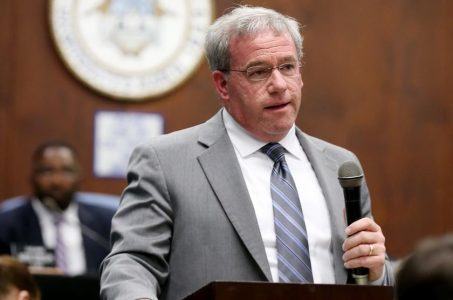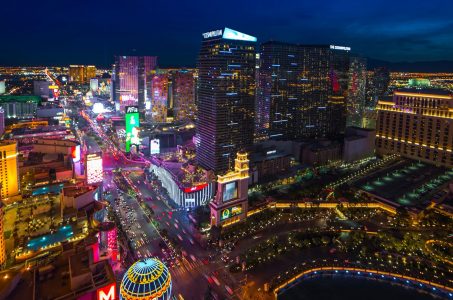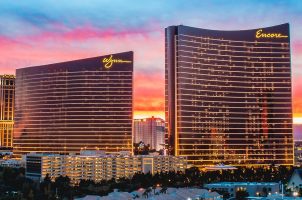MGM Q2 Operating Loss Plunges to $1 Billion, EPS, Revenue Miss Street Expectations
Posted on: July 30, 2020, 03:45h.
Last updated on: July 31, 2020, 08:47h.
MGM Resorts International (NYSE:MGM) posted a second-quarter operating loss of $1 billion, as the coronavirus shutdown kept many of the operator’s gaming venues closed for much of the April through June period. But CEO Bill Hornbuckle said it’s unlikely the company will consider selling a domestic property over the near-term.

The Mandalay Bay operator said it lost $1.67 a share on revenue of $289.81 million in the June quarter. Wall Street expected a loss of $1.60 on turnover of $408.95 million. The stock sank 5.10 percent in Thursday’s after-hours session.
In its home market of Las Vegas, where it’s the largest operator on the Strip, MGM reopened Bellagio, MGM Grand, and New York-New York on June 4, followed by Excalibur a week later and Luxor on June 25. The remainder of the company’s Strip properties were closed for all of the second quarter.
Net revenues decreased 90 percent compared to the prior year quarter to $151 million as a result of the temporary closure of Las Vegas Strip properties and other operational restrictions related to the pandemic,” said a company statement.
In addition to the aforementioned venues, MGM runs Aria, Vdara, Mirage, and Park MGM on the Strip. In the wake of the pandemic, there’s been considerable scuttlebutt about the fate of Luxor and the Mirage, with rumors swirling the former could be demolished and that the latter is up for sale.
On a conference call with analysts and investors, MGM CEO Bill Hornbuckle, who recently had the “interim” tag removed from his title, said the company is taking reservations for Mirage and Park MGM for Aug. 27, and that it’s “not our intent to keep them closed forever.” He added that there are currently no discussions of parting with domestic assets.
“Mirage is important to us. It’s an amazing brand,” said Hornbuckle.
Regional Green Shoots
As is the case with rivals, MGM pointed to some signs of life in its regional portfolio following the coronavirus reopening.
In particular, its Mississippi venues — the Gold Strike and Beau Rivage — restarted on May 25, 2020, and June 1, 2020, respectively, providing some time for those properties to contribute something to the operator’s second-quarter results. Overall, regional revenue dipped 90 percent because of closures. MGM Northfield Park in Ohio restarted on June 20, while MGM National Harbor in Maryland was open for just two days in the quarter.
Hornbuckle told analysts MGM’s regional properties remain strong, saying National Harbor’s performance since reopening is “exceptional,” and that drive-in properties, including the Mississippi pair, are perking up, too.
He said the biggest hindrance to regional casinos are the variety of capacity restrictions operators are contending with in the COVID-19 world. Those include limits on how many slot machines are available and caps on how many players can be at tables.
When MGM Grand Detroit reopens on Aug. 5, that will leave Empire City in New York as the only one of the company’s regional properties still shuttered.
Cost Comments, Japan Update
MGM said it had $8.1 billion worth of liquidity as of June 30 against $11.4 billion. CFO Corey Sanders said on the call that prior to the pandemic, the company’s operating costs were $8 million per day, with about half of that devoted to payroll expense. Less than half of MGM employees have returned to work.
Regarding Japan, where MGM, in partnership with local industrial firm Orix, is the lone contender in Osaka, Hornbuckle said the request for proposal (RFP) process could be delayed into early 2021, adding that MGM is “ready to submit either way”
He added the company is fond of its positioning there and that it’s not an “all-in” commitment because MGM’s percentage in the agreement with Orix will be 40 percent to 45 percent.
Related News Articles
Caesars, Wynn Resorts Among Barron’s Picks for 2021 Travel Rebound
Domestic Gaming Equities Preferable to Macau Fare, Says Research Firm
Most Popular
Mirage Las Vegas Demolition to Start Next Week, Atrium a Goner
Where All the Mirage Relics Will Go
Most Commented
-
Bally’s Facing Five Months of Daily Demolition for Chicago Casino
— June 18, 2024 — 12 Comments
















No comments yet